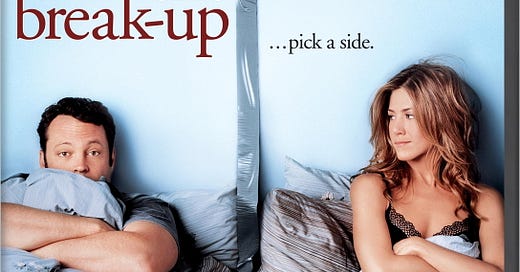The Break-Up is not the movie most people expect it to be.
At the beginning, it seemed like a romantic comedy — Two people meet at a game, laugh, go out together, fall in love, move in together, a romantic clash between opposites.
But beneath all this, something far more uncomfortable was revealed: a picture of two people who loved each other and still fell apart.
The story doesn’t center on infidelity or a grand betrayal.
There are no villains in this story, just two people caught in the slow unraveling of a once-beautiful bond.
One of the movie’s devastating moments seemed really ordinary. Brooke pleads with Gary to help more around the house not because she can’t do it herself, but because she wants to feel cared for.
She wants to matter.
She wants her presence, her efforts, her needs to be acknowledged without having to “ask”.
What she’s really saying is: show me that I’m not alone in this.
And Gary, like so many people, doesn’t understand. Not until it was far too late.
This is the tragedy the movie explores: the death of love by a thousand little dismissals.
The kind of break-up that doesn’t come from a single, shattering event, but from an accumulation of unmet needs, unspoken frustrations, and emotional distance.
Another gut wrenching moments comes near the end. Brooke, exhausted and heartbroken, finally breaks down in tears. She lays bare the pain she’s been carrying, the loneliness she’s felt while lying beside someone who couldn’t or wouldn’t see her.
Gary, suddenly faced with all the pain she was feeling, asks: “Why didn’t you tell me?”
And Brooke, already defeated, says: “I did.”
He responds: “But not like this.”
That line is a gut punch.
It captures a sort of emotional disconnection how people cry for help in a hundred quiet ways, and yet those cries go unnoticed until they become too loud to ignore.
Until it’s too late.
What makes The Break-Up especially interesting is its refusal to offer resolution. There’s no dramatic reconciliation, no teary reunion. (P.S. I love this.)
Just two people who shared something real, and who couldn’t make it work.
It’s a very bold choice to end a “love story” without the lovers. But in that choice lies a hard truth.
Sometimes, love isn’t the glue people believe it to be.
It cannot compensate for a lack of effort, or empathy and sometimes, two people who genuinely care for each other are simply not compatible in the ways that matter most.
This kind of ending is hard.
It sits in the chest and forces us to confront the truth: that relationships don’t always end because of the absence of love. Sometimes, they end even in the presence of it.
Perhaps that’s the most painful ending of all.
On a final note, you all should watch this movie.



![The Break-up (DVD Widescreen) [DVD] The Break-up (DVD Widescreen) [DVD]](https://substackcdn.com/image/fetch/w_1456,c_limit,f_auto,q_auto:good,fl_progressive:steep/https%3A%2F%2Fsubstack-post-media.s3.amazonaws.com%2Fpublic%2Fimages%2Fbb2a0dbe-9281-4574-a6e9-570a5470be9a_2176x3053.jpeg)